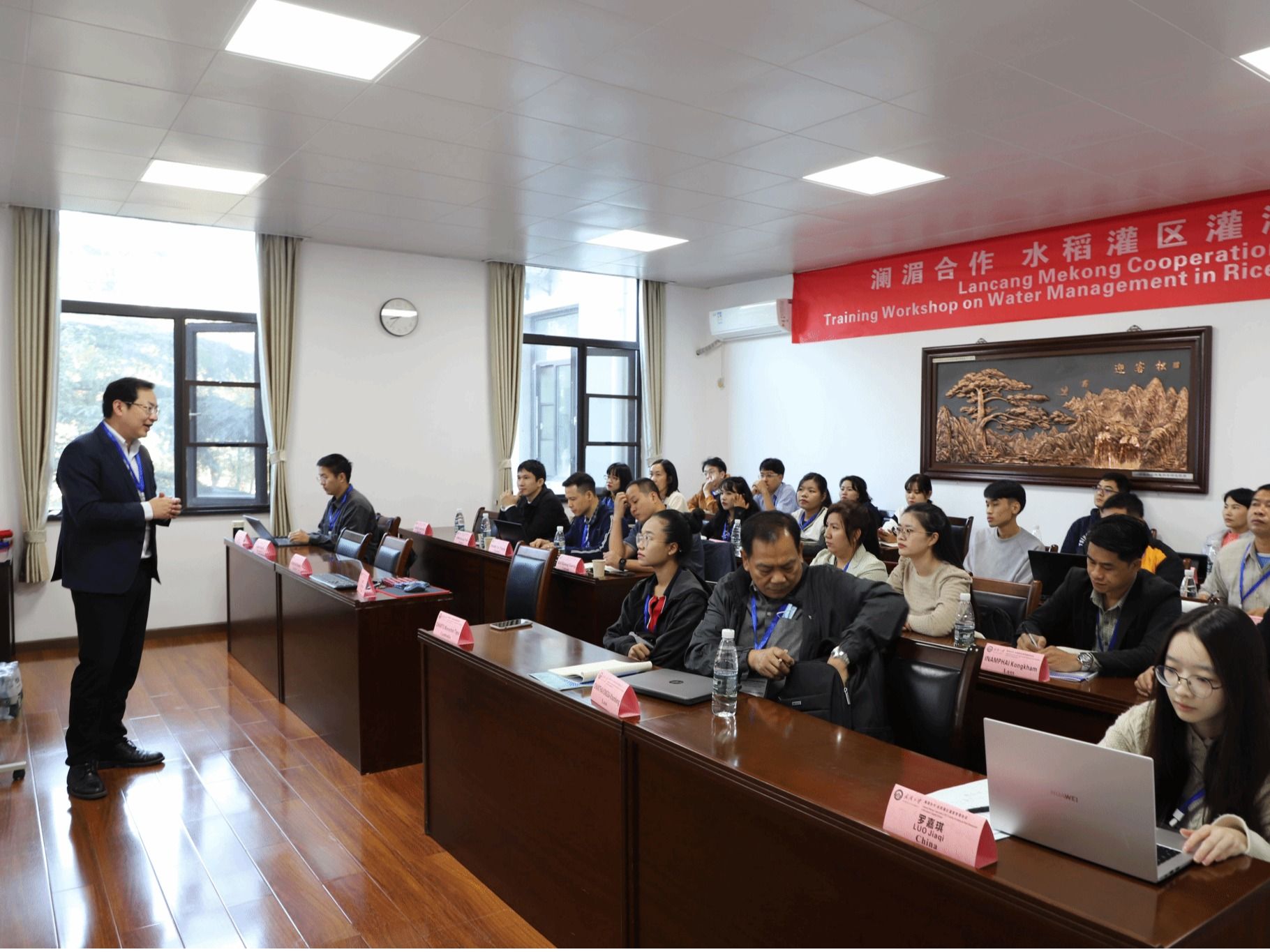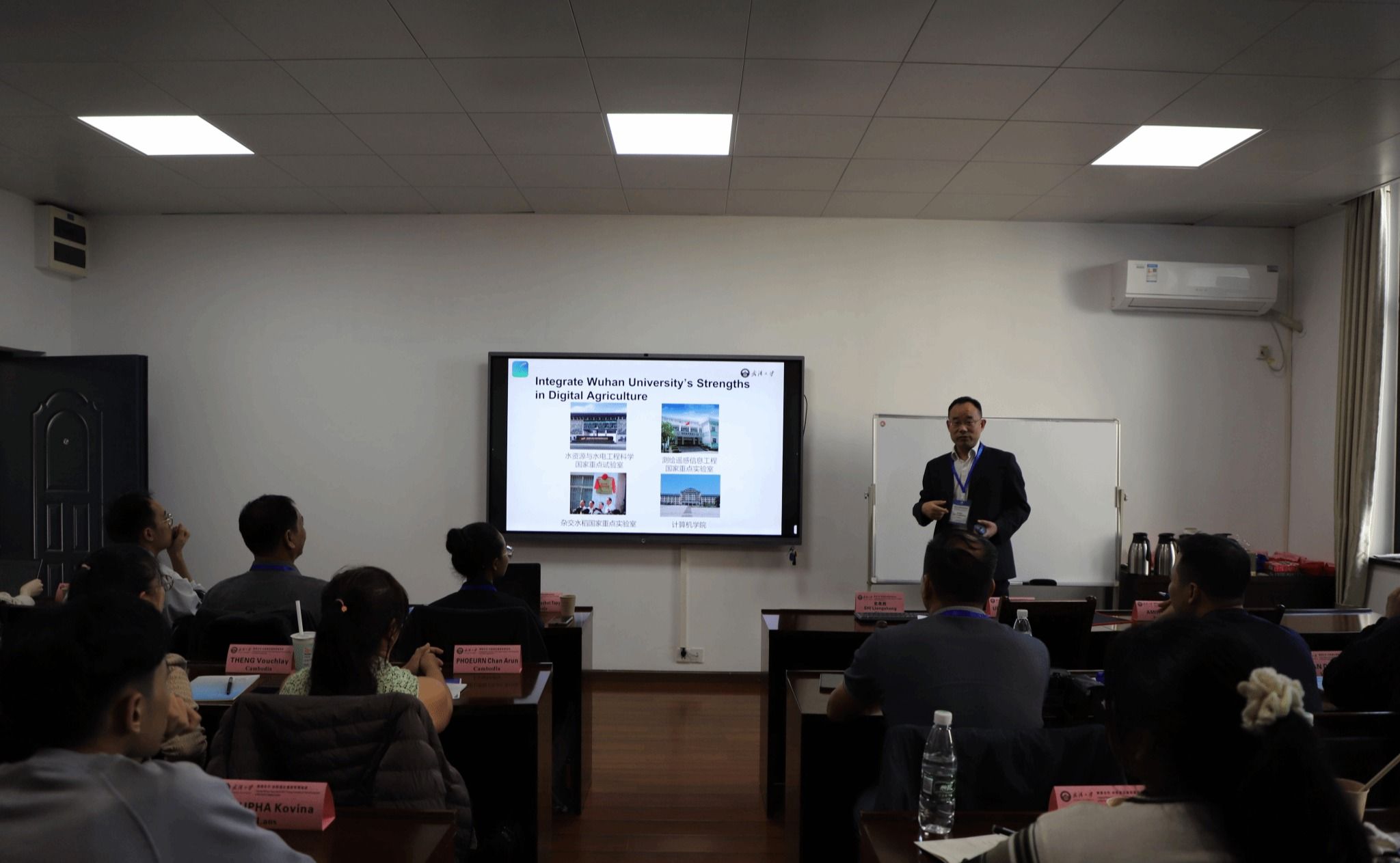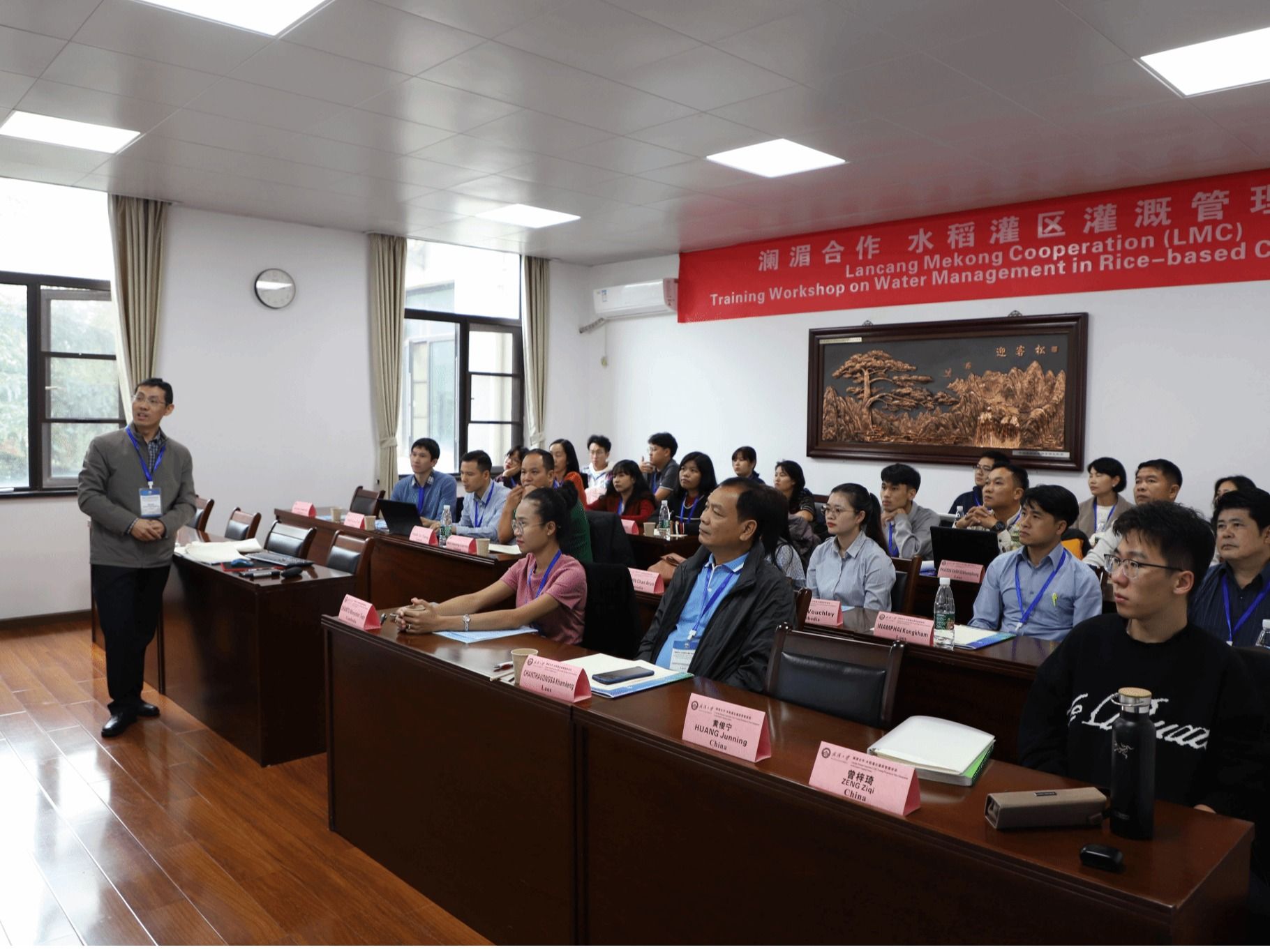On November 6, 2023, the Training Workshop on Water Management in Rice-based Cropping Systems, jointly organized by the School of Water Resources and Hydropower Engineering and the State Key Laboratory of Water Resources Engineering and Management of Wuhan University, opened in Wuhan. More than 20 scholars from universities or related departments of the five Lancang-Mekong River basin countries, including Thuyloi University of Vietnam, Yangon Technological University of Myanmar, Institute of Technology of Cambodia, Chulalongkorn University of Thailand, National University of Laos, Ministry of Education and Sports of Laos, and Department of Irrigation of the Ministry of Agriculture and Forestry of Laos, came to Wuhan on Nov. 5th to participate in the training workshop. The training workshop included lectures, laboratory visits, group discussions and other arrangements, and the first week of activities ended successfully. A summary of the first week of the training workshop is as follows:
11.5
In the late afternoon and evening of November 5, scholars from the five Lancang-Mekong River basin countries arrived at Tianhe International Airport one after another.




11.6
On the morning of November 6, the Training Workshop on Water Management in Rice-based Cropping Systems was officially opened. Scholars from the five countries, Gui Ling, Deputy Director of Office of International Affair of Wuhan University, Prof. Cheng Lei, Vice Dean of School of Water Resources and Hydropower Engineering of Wuhan University, Prof. Qian Zhongdong of the State Key Laboratory of Water Resources Engineering and Management, and Prof. Dong Bin, Director of the International Research Center for Water Resources and Hydropower Engineering of Wuhan University, participated in the opening ceremony, which was presided over by the Secretary of Foreign Affairs of School of Water Resources and Hydropower Engineering of Wuhan University, Ms. Huang Xiaoyu.
After the opening ceremony, Prof. Liu Dedi from School of Water Resources and Hydropower Engineering of Wuhan University gave the first report of this training workshop. Prof. Liu shared his research results on the topics of "Equitable Water Resources Allocation Based on Multi-Objective Optimization" and "Integrated Water Resources Management", and had a lively discussion with the scholars on the priority of water allocation.
In the afternoon, Prof. Chen Jie gave a report entitled "Global Climate Change and its Impact on Hydrology and Water Resources", sharing his research results on water cycle, climate change, climate and extremes. Participants actively discussed with Prof. Chen on bias correction, data change model and climate model.
After the reports, the scholars were guided by volunteers to visit the campus of Wuhan University to experience the humanistic history and campus scenery of Wuhan University, which is about to celebrate its 130th anniversary.




11.7
On the morning of November 7, Prof. Liu Pan from School of Water Resources and Hydropower Engineering of Wuhan University made a report on "Joint Optimal Dispatch of Reservoir Groups", and Prof. Cheng Lei from School of Water Resources and Hydropower Engineering of Wuhan University made a report on "Impacts of Vegetation on Regional Water Resources under Changing Environment", and had a warm discussion with the scholars on topics such as hydropower price, rice price, etc.
In the afternoon of Nov. 7, Prof. Shi Liangsheng from School of Water Resources and Hydropower Engineering of Wuhan University made a report titled "China's Intelligent Agriculture", and introduced his research team's new application "Jiahe Agriculture", which relies on core technologies such as deep neural network for agricultural scenes and SPAC data assimilation system to solve the problem of standardized management in changing environment. The scholars were very interested in the research topics and results of Prof. Shi's team, and expressed that they were looking forward to visiting Prof. Shi's lab again.
After the reports, the participants were led by Cai Rui, deputy director of the State Key Laboratory of Water Resources Engineering and Management, to deepen their understanding of the School of Water Resources and Hydropower Engineering of Wuhan University and the State Key Laboratory of Water Resources Engineering and Management.




11.8
On the morning of November 8, Prof. Luo Yufeng from School of Water Resources and Hydropower Engineering of Wuhan University gave a report on "Intelligent Irrigation", highlighting the practical irrigation water calculation model and the underlying algorithmic logic of intelligent irrigation, and pointing out that there are still many challenges to be overcome in realizing intelligent irrigation. Scholars in the workshop agreed with the research on intelligent irrigation.
In the afternoon of November 8, Prof. Dong Bin from School of Water Resources and Hydropower Engineering of Wuhan University organized a discussion session on "How to View the Current Trends of Climate Change and Response Strategies", in which the scholars from different countries discussed heatedly and enthusiastically, introduced the impacts of climate change on agriculture of their own countries in detail, and shared the strategies of coping with the extreme climate disasters in their respective countries.
Afterwards, we visited the State Key Laboratory of Hybrid Rice, where Deputy Director Hu Jun led us to visit several important research laboratories, including the Rice Culture Room and the Rice Gene Cloning Laboratory.




11.9
On the morning of November 9, Prof. Dong Bin gave a report on "Water Saving Irrigation in China" and "Calculation of Rice Water Requirement and Irrigation System", which introduced the current situation of China's water-saving irrigation technology, the current situation of rice cultivation and irrigation system under the intelligent agriculture. The report introduced the current status of water-saving irrigation technology in China, the current status of rice cultivation under smart agriculture and irrigation system. The scientific rice irrigation system in China attracted the attention of the scholars.
In the afternoon of November 9, Prof. Zha Yuanyuan from School of Water Resources and Hydropower Engineering of Wuhan University gave a report on "Water and Fertilizer Management in Precision Agriculture: From Experiment to Model Building", in which scholars praised the introduction of remote sensing, artificial intelligence and other cutting-edge technologies into the application of agricultural water and fertilizer management.
After the reports, teachers and students visited the State Key Laboratory of Information Engineering in Surveying, Mapping and Remote Sensing, where Cai Leifei, Deputy Director of the Laboratory, organized a warm welcome ceremony and introduced in detail examples of the application of remote sensing technology closely integrated with water conservancy engineering. Afterwards, the international student group of the School of Remote Sensing had a friendly exchange with the participants and expressed their welcome to the scholars to participate in Wuhan University's international exchange programs in the future.




11.10
On the morning of November 10th, Prof. Zhu Yan from School of Water Resources and Hydropower Engineering of Wuhan University gave a report on "Agricultural Assessment and Management Measures of Salinization in Asia-Pacific Region", which introduced the causes, distribution and hazards of soil salinization on agricultural development, and put forward the optimization of planting structure, dredging of drainage and desalination channels and other engineering measures, which are important for saline land improvement in Asia-Pacific region.
Subsequently, Wu Jingwei, Professor and UNESCO Chair at the School of Water Resources and Hydropower Engineering of Wuhan University, gave a report on "Water-Food-Environment Relationships in Irrigated Agriculture", which introduced the problem of uneven distribution of China's agricultural production and annual rainfall, and analyzed the importance of irrigation for food security, social development and environmental protection, and put forward a number of practical engineering measures. He also analyzed the importance of irrigation for food security, social development, and environmental protection, and proposed a number of practical engineering measures, and the participating scholars praised China's experience. After the lecture, Prof. Wu Jingwei took a group photo with the scholars.
In the afternoon of November 10th, Prof. Qian Zhongdong gave a report on "Sediment Erosion and Hydraulic Machinery Protection in Himalayan Water Resources Development".After the lecture, Prof. Qian and the scholars visited the Hydropower Research Center for Himalaya Region and Groundwater Laboratory.




The first week of the training workshop successfully ended. Next week there will be more reports, study visits and group discussions. Next Wednesday, the participants of the workshop will go to Zhanghe Irrigation System to experience first-hand China's practical experience in modernizing irrigation system, as well as in managing, maintaining and upgrading irrigation projects. Please stay tuned for more details!